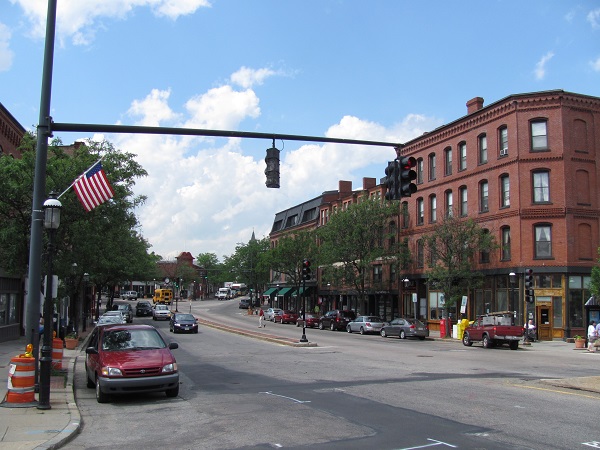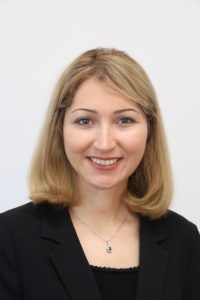Solicita ahora para formar parte de nuestra próxima grupo de Becados en Ciencia científicos comunitarios y líderes comunitarios.

The Brookline, MA-TEX project “Building Community Resilience to Extreme Heat” started in February 2016 and completed a year later. The Town of Brookline was concerned about the growing number of extreme heat days it was experiencing and the adverse effect it would have upon vulnerable populations, particularly its elderly population.
Maria Morelli of Brookline’s Town Planning department served as the community lead throughout this project. In February 2016, TEX helped to connect Dr. Auroop Ganguly, Sustainability and Data Sciences (SDS) lab, Northeastern University, and Dr. Evan Kodra, risQ to the town. By April 2016, Dr. Ganguly had brought on students from his lab led by Dr. Hanieh Hassanzadeh. In addition to Ganguly and Hassanzadeh, SDS lab students Babak Fard and Mary “Lizzy” Warner were instrumental to the technical portion of this project.
The scientists were charged with three main tasks:
The team led by Dr. Auroop Ganguly has successfully completed the Brookline report entitled “Mitigation and Adaptation Strategies for Public Health Impacts of Heatwaves for the Town of Brookline, MA”. It includes downscaled global climate projections for urban heat islands in Brookline. It focuses upon 6 vulnerability factors for which data was extracted from the Census in the block group scale. These factors include: poverty, educational attainment, over 65 years old, over 65 years old (living alone), household living alone and non-white races. The team looked at tree canopy analysis as a mitigation strategy and cooling center distance analysis as an adaptation strategy.
Overall, the team assessed both the spatial and temporal changes in heatwaves and their impacts upon public health in the Town of Brookline at the block group scale. They found that there is a correlation between poverty and effects of high heat because the smaller the size of living areas the built environment tends to be more dense. Vulnerability and hazard maps created in this project may be used for the preliminary stages of policy and decisionmaking, and determining block group level priorities. Their results also show that land surface temperature is higher over areas with higher imperviousness because of urbanization.
This report is a preliminary analysis of the effects of heat upon Brookline. As a next step, the team suggests that Brookline do a comprehensive study of heatwaves that incorporate different aspects of social, health and climate factors.
Therefore, in their report addendum, the team recommends:
In addition to the report and addendum, the team presented their findings to the Town of Brookline’s Climate Action Committee on 23 January 2017. Their presentation was well received since there had never been such a study focused upon Brookline before. Maria Morelli says that this work will give them solid scientific evidence why attention to heatwaves in the town is needed as well as scientific evidence for a budget for ongoing data collection.
For more information about the report and addendum, please contact:
Dr. Auroop Ganguly [email protected]
Dr. Hanieh Hassanzadeh [email protected]
Sustainability and Data Sciences (SDS) Lab at Northeastern University: www.northeastern.edu/sds
In the greater Boston metropolitan area, the town of Brookline, MA, is concerned over threats posed by heat extremes in temperature. Importantly, vulnerable populations, such as the growing number of elderly in the community, are making these extremes more palpable. Although larger municipalities in the greater Boston area have data on heat extremes and are willing to share this data, Brookline does not currently have data on how heat will affect the town specifically. However, area projections do show a significant increase in the number of dangerously hot days and longer and more frequent heatwaves in the coming decades – underscoring the need to address heat and potential impacts to public health.
The region’s planners and sustainability managers – organized through the Metropolitan Area Planning Council (MAPC) – are committed to creating local climate vulnerability assessments for communities in the area. Brookline would like to show progress towards the development of their vulnerability assessment by the time MAPC expects to host a climate change preparedness summit in November 2016. At this stage, identifying all available data sources relevant to the town of Brookline and high heat extremes and synthesizing this data into an initial assessment of heat vulnerability is most important.
Since there will likely be a Climate Change Preparedness Summit in the area in May 2016, Brookline would like to be able to showcase some progress toward the development of a local climate vulnerability assessment by that time. Work may continue beyond that time, depending on the needs of the town as well as the availability of the scientist.
The scientific partners will work with Lara and the town of Brookline to develop a report that will elaborate upon the heat extremes that the town can anticipate and how those extremes may affect vulnerable populations

Auroop Ganguly’s student team at Northeastern University, led by Dr. Hanieh Hassanzadeh, has analyzed the importance of both social and physical factors in the occurrence of heatwave events in the town. Vulnerability and exposure parameters for each block include a combination of age, poverty, literacy level and the number of one-person households. Preliminary analysis shows correlations between the urban heat island (UHI) effect and social factors. In the coming weeks, the team plans to use predictive models of future land development to analyze possible changes in UHIs. By using different scenarios, they will then develop risk models for the aforementioned vulnerability and exposure parameters. The team will eventually suggest guidelines for heatwave action plans based on the town’s resources.
Morelli expects that the Northeastern team will be able to prepare a presentation for Brookline’s climate action team by mid-October. By early November, she anticipates being able to report to the Metro Mayors’ Coalition on extreme temperatures and their local impacts in Brookline. By the next update, Morelli expects that the team will have been able to draft a report for a general audience to understand Brookline’s vulnerabilities. This report will help to make a case for certain town policies.
Morelli expresses that Brookline would never have been able to have a research team at the forefront of this critical heat wave work and is grateful for the support of both Northeastern and TEX thus far.
Marie Morelli serves as Senior Planner for the Town of Brookline, a municipality in the Greater Boston region with approximately 58,000 residents.

Dr. Auroop R. Ganguly is an associate professor of Civil and Environmental Engineering at Northeastern University in Boston, MA, where he directs the Sustainability and Data Sciences Laboratory (SDS Lab). His research encompasses three interlinked areas, specifically, climate extremes and water sustainability, infrastructures risk and resilience, and data sciences for complex systems. He has about 18 years of professional experience in this country spanning academia, government national research laboratory and the private sector.

Dr. Hanieh Hassanzadeh is an Associate Research Scientist at Sustainability and Data Sciences Laboratory (SDS Lab) at Northeastern University, Boston. She works on the resilience of critical infrastructures facing natural and man-made hazards, utilizing Data Sciences tools. Hanieh has a PhD in Atmospheric and Climate Sciences from ETH Zurich University. Before joining SDS Lab, she had an appointment as a scientist at Harvard University.
(c) 2024 Thriving Earth Exchange